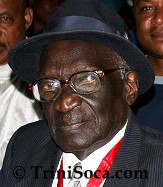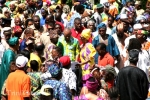Raffique Shah
Sunday, April 1st 2007
 LAST week the world’s conscience drifted back in time, some 400 years, to the barbaric transatlantic slave trade, and to the bicentennial of its formal abolition in 1807. What I read and heard of apologies sans reparations, of manufacturing heroes and liberators while ignoring those who really fought to free themselves, I found nauseating. I noted, too, that the hypocrisy of the descendants of the slavers was matched by the hypocrisy-or ignorance-of those whose forebears were victims of slavery. It’s all a charade designed to distort history, to extort money from those who have no obligation to pay for the sins of others, and to play the blame game.
LAST week the world’s conscience drifted back in time, some 400 years, to the barbaric transatlantic slave trade, and to the bicentennial of its formal abolition in 1807. What I read and heard of apologies sans reparations, of manufacturing heroes and liberators while ignoring those who really fought to free themselves, I found nauseating. I noted, too, that the hypocrisy of the descendants of the slavers was matched by the hypocrisy-or ignorance-of those whose forebears were victims of slavery. It’s all a charade designed to distort history, to extort money from those who have no obligation to pay for the sins of others, and to play the blame game.
Continue reading No man must ride your back

 The Copyright Music Organisation of Trinidad and Tobago (COTT) was thrown into mourning yesterday afternoon, as news of the death of calypso composer, the Mighty Terror, swirled through the local music community.
The Copyright Music Organisation of Trinidad and Tobago (COTT) was thrown into mourning yesterday afternoon, as news of the death of calypso composer, the Mighty Terror, swirled through the local music community. Bio: Born in Tobago, Warner-Lewis grew up in Trinidad where she received her early education. In 1962, she won a Trinidad and Tobago Scholarship to study English Literature at the University of the West Indies in Jamaica. In 1970 she returned to Jamaica to lecture at the Univeristy of the West Indies and dedicated her life to studying the connections between Central Africa and the Caribbean that were forged through slavery.
Bio: Born in Tobago, Warner-Lewis grew up in Trinidad where she received her early education. In 1962, she won a Trinidad and Tobago Scholarship to study English Literature at the University of the West Indies in Jamaica. In 1970 she returned to Jamaica to lecture at the Univeristy of the West Indies and dedicated her life to studying the connections between Central Africa and the Caribbean that were forged through slavery. It’s the columnist’s perennial dilemma: what topic to address on a Carnival Sunday? Who reads newspapers around this time anyway? Pan “peongs” in their thousands will be bleary-eyed and either celebrating the sound of steel or fuming over the judges’ decisions from last night’s Panorama finals. Many more who will have attended Friday night’s cacophony, “Soca Monarch”, rendered tone-deaf by noise boxes supreme, are too dazed to do anything but seek out more noise. And the few who have remained sober until now will be psychologically adjusting their systems for the stupor that will start by nightfall.
It’s the columnist’s perennial dilemma: what topic to address on a Carnival Sunday? Who reads newspapers around this time anyway? Pan “peongs” in their thousands will be bleary-eyed and either celebrating the sound of steel or fuming over the judges’ decisions from last night’s Panorama finals. Many more who will have attended Friday night’s cacophony, “Soca Monarch”, rendered tone-deaf by noise boxes supreme, are too dazed to do anything but seek out more noise. And the few who have remained sober until now will be psychologically adjusting their systems for the stupor that will start by nightfall. The arbitrary and selective conduct of the police in responding to recent popular protest movements raises fundamental questions on this response and its linkage with the composition of the protective services in plural Trinidad and Tobago. In cosmopolitan societies but more so in a multicultural but in an ethnically polarised T&T our cosmopolitan people must be provided with every basis to identify with the police. The police must never be perceived or be used as a mechanism for political repression or constitute a potential threat to any democratically elected government or act as an arm of the Executive as it is being perceived today in T&T.
The arbitrary and selective conduct of the police in responding to recent popular protest movements raises fundamental questions on this response and its linkage with the composition of the protective services in plural Trinidad and Tobago. In cosmopolitan societies but more so in a multicultural but in an ethnically polarised T&T our cosmopolitan people must be provided with every basis to identify with the police. The police must never be perceived or be used as a mechanism for political repression or constitute a potential threat to any democratically elected government or act as an arm of the Executive as it is being perceived today in T&T.